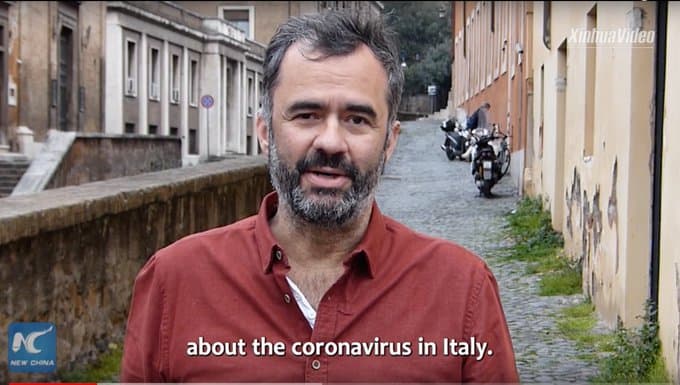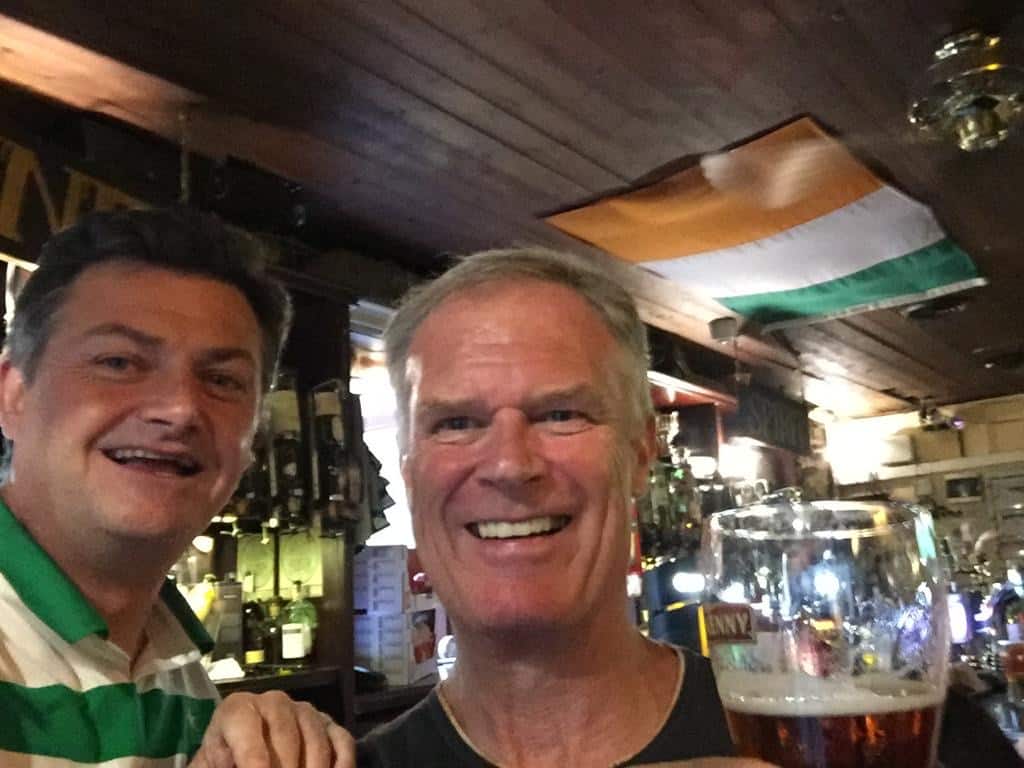In virus-torn Italy, misery loves company but our suffering is soothed with pride

Sergio Serra rents out holiday houses around Rome. He has a wife and a 3-year-old daughter. Underneath all the death, the overflowing hospitals, the empty streets and the fear as the coronavirus cuts its swath through Italy, Sergio is one of many stories that doesn’t get told.
“My income,” he said, “is completely zero.”
Unlike many of his friends, such as myself, he’s not sitting around watching Netflix. He’s scrambling to find a way out of tailspinning circumstances totally beyond his control.
“I’m losing a lot of money,” he said. “I’m trying to face all the payments I have, mandatory payments for electricity, power supply. I’m a bit nervous about that.”
It’s why on Monday I reached out to my friends, none of whom I have seen since I departed for Saudi Arabia Feb. 17 and returned 12 days later to find Italy in the early throes of nationwide paralyzation. If you read my last two blogs — life inside caronavirus’ petri dish two weeks ago and life in lockdown last week — you’ll know Italy is ahead of the worldwide curve on restrictions.
Well, it got worse.
Hours after I posted my last blog Wednesday, prime minister Giuseppe Conte ordered all bars and restaurants closed. We were all ordered inside. We can’t go out unless we: one, have a medical issue; two, have a required errand (grocery shopping, post office, bank); three, are going to work; four, returning home. And if we do go out we must carry a government-issued form with one of those reasons checked off. Without it, we could be fined 300 euros or put in jail. The government just added a box to check if you have not been quarantined.
The last social thing I’ve done came March 8 when I went to my local birreria to watch the Juventus-Inter Milan soccer match — with no fans. Earlier that day was the last time I saw my girlfriend. Marina took me to our clinic for a checkup, scheduled long ago, on an inflamed prostate. No, I don’t have the virus. For a later appointment, she couldn’t accompany me into the clinic. It was against regulations.
We devised a plan to rendezvous in a park, posing as joggers. But, unfortunately, one of the allowed reasons for leaving home is not wild, animalistic sex. A few hours after our plan, it became a moot point.
The government closed the parks.

Also, Marina brought up a valid point. We don’t know if we have it. One could have the virus for up to 14 days without showing symptoms. She works in an office with many old men, and her parents she looks after are in their 80s; I have occasionally taken public transportation, an absolute buffet for the virus. She didn’t want one of us giving it to the other without knowing it. I wholeheartedly agreed. Instead, Monday night we had a video date on Whatsapp. It was similar to my nightly calls to her last May from Central Asia.
The only difference is now she’s only four miles away.
Since going to the clinic for the last time Wednesday, I have left my apartment twice: on Friday I went around the corner to my pharmacy to see if they had masks for Marina who can’t find any. They had none. Yesterday morning I went grocery shopping and to the post office to pay bills. I did it all in a mask I picked up in my hotel in Saudi Arabia, just in case I thought at the time, and plastic gloves I picked up in my supermarket’s produce department.
I’ve gone nowhere else.
I have continued reading my Francesco Totti autobiography, “Un Capitano,” a slow 500-page slog in Italian; watched Elena Ferrante’s series, “My Brilliant Friend,” about Naples in the 1960s and ‘70s; watched Ken Burns’ 1992 nine-part documentary, “Baseball;” written emails; cooked; tried rescheduling my March 28 birthday trip to Asturias, Spain; had senseless Facebook debates with knuckle-dragging Donald Trump supporters who believe the coronavirus is a media hoax; and researched said coronavirus.
27,980 cases in Italy
The numbers are right out of a horror film script. The number of cases in Italy has gone from 3,800 two weeks ago to 10,149 last week to 27,980 Monday. The number of deaths has skyrocketed from 148 to 631 to 2,158, respectively. Italy’s 23,073 active cases (total cases minus number of deaths and recovered patients) is more than China, Iran and the U.S. combined. For those keeping score at home, worldwide it’s 186,689 cases and 7,471 deaths. (Still think it’s no worse than the flu, Trumpeteers?)
The new international danger zone is Lombardy, where Milan is its base and the town of Codogno is the epicenter. The region has 14,649 cases (1,420 deaths) with Bergamo leading the country with 3,760 cases. Rome has only 412 cases. Its Lazio region has 523 (19 deaths). We’ve been lucky — so far.
This is not news to Italians. We all follow the charts, provided dutifully by the honest government, like we do the daily weather. It’s why no one is complaining about the country’s draconian measures. But it’s also why people like Sergio are struggling.
He isn’t the only one. Tour guides, waiters, souvenir stand owners, none of them has income. Businesses have already folded. Friends are asking friends for loans. Adding more doom, even when (if?) this virus dies, how soon will tourists come to the world’s most infected country outside China?

When I called Sergio, 47, to see how he was doing, he was also fighting a cold. (“I DON’T have the virus,” he said with a chuckle.) His wife, Rita, stopped working as an assistant on trains doing the long-cancelled Rome-Palermo, Rome-Bolzano runs. However, recently she learned she’ll start receiving emergency wages of about 80 percent of her previous income.
He’s spending his time playing with his daughter, watching TV and feeding a lifelong passion for Russian culture by studying the language. It hasn’t relieved the stress.
“I’m quite worried,” he told me. “I’m not thinking real disaster like in a war but I’m quite worried. I think there will be a financial, international crisis. International authorities, monetary and financial authorities, should take steps now to prevent a crisis that could be heavier than it is at the moment.”
I know it’s going to get worse. With no virus (I don’t think) and no family and a kitchen full of food, my only concern is my finances. I made the mistake of peeking at my stock portfolio Sunday and my Denver broker had to talk me off my fifth-floor balcony. I’ve lost about 15 percent. Some have lost 30, she said. It wasn’t reassuring. What is reassuring is her forecast, as well as every other’s I’ve read from The New York Times to TV’s carnival barker of a stock analyst, Jim Cramer. They all say don’t sell. The market will right itself, eventually. It always does.
When businesses return, they say, so will the market. And if Trump doesn’t return, the market could explode in 2021.
I called my fellow retired America expat, John Samuels. We are fellow Romanisti, fans of AS Roma who spent at least two nights a week watching our club play from the designated upstairs room of Abbey Theatre Irish Pub near Piazza Navona or at Stappo around the corner from me. We also are fellow film extras who played cardinals in Paolo Sorrentino’s “The Young Pope” and “The New Pope.”
John, who moved here three months before I did in 2014, is a news junkie. He has more coronavirus graphs on his laptop than a CDC intern.
“The information is sort of a mental health cure to watching the panic in the States and around the world,” he said. “When you do that, it starts to take the emotions out of it. The data itself and the virus itself is not an emotional thing.
“It actually makes me feel more optimistic. If I relied on Facebook or emails or friends, I’d probably be climbing walls. I find the information certainly negates some of that. I’m thankful I’m here. I can go to websites at 6 p.m. You can’t do that every day in the U.S. There’s no central site for that.”
John doesn’t wear a mask, unlike me. I’m a late convert. He lives in my old Testaccio neighborhood and, like me, is thoroughly impressed, and almost moved, by how well Italians are following the rules.
“I’m certainly more cautious,” he said. “If I hear someone cough, it’s hard not to look in that direction. But I’m not as concerned as I thought I might be. The measures are easy to comply.”

Eric J. Lyman is a fellow American freelance journalist who has carved out a nice living since moving here in 2000. He writes for USA Today and the Chinese wire service, Xinhua, among other news sources. He’s the one friend who had a serious health scare. He went to Milan to report on the virus and when he returned he suffered a slight fever, one of the virus symptoms. He also had a sore throat.
The sore throat turned into a cough, another symptom, and he got tested the next day on March 7. It’s a simple swab of the mouth and he was in and out in 10 minutes. He called his mother in Florida. When Eric was an infant, his older brother died at 3. When he called her, his mother began to cry.
Eric didn’t get the results until three days later. A woman looked him up and said, “You’re OK. You just have a cold.”
“I had been calm since I took the test and could be relied on to tell my friends to be calm, but the good news hit me like a wave,” he wrote in a first-person account in USA Today. “I began to cry.”
Later, he did a stand-up report for Xinhua and talked about his stroll around Rome’s beautiful but now vacant piazzas and monuments.
“I had an experience several years ago when I was on a movie set in Cinecitta which is a movie studio here in Rome,” he said in the report. “They had rebuilt part of the city and I remember walking around on it and feeling that it looked like Rome but didn’t feel like it. I have that same sensation now that I’m here.”
Alessandro Castellani, a native Roman and my longest friend in Rome, has the same feeling. We met as fellow sportswriters and he continues going to his office at ANSA, Italy’s wire service. It’s right in the heart of Rome and every day at work it’s like going to a different city. One major change is people no longer need validation to enter the Center.

“I go to work at 4 o’clock,” he said. “Usually even if you have permission, at 4 p.m. it’s difficult to find a spot to park. Now the Center is a desert. It’s completely deserted. It’s very depressed. My work is very close to Trevi Fountain. Trevi Fountain is always very, very crowded. Sometimes in the spring and summer I must push to get past people to work.
“Now there is no one. It’s just me and policemen.”
He’s assigned to cover the Tokyo Olympics which may join the long of list of cancelled sports, including our beloved soccer. The 2020 European Championships, which was set to open in Rome June 12, got postponed Tuesday to 2021. However, like everyone else here, all our perspectives have been put in a blender and scrambled.
“I feel sad like everybody in Rome,” he said. “But I don’t think too much about football now, to be honest.”

If there’s anyone who will suffer tonight, it’s my friend Patrick O’Byrne. He’s Irish. He moved to Rome two years ago to work for the European Union and now is between jobs. He’s spending all his time in his apartment in the tony Parioli neighborhood with his lawyer girlfriend, Valeria, who’s working from home. He spends his time tearing his hair out over what he reads on Facebook. For a sedative he takes Baldo, the dog of Valeria’s mom, around the neighborhood.
“It’s a license to walk,” he said.
Normally tonight he’d be at Finnegans, his favorite Irish pub near the Colosseum. It’s St. Patrick’s Day and Finnegans is closed.
“I’ve got some beers and am going to make some beef, something resembling Irish,” he said.
However, in Italy one learns to look at the bright side. Here there is so much bright side to see. I’ve always said that you’re never too depressed for too long here. For in Italy, no matter how lonely you get with your life, how frustrated you get with the language, how mad you get at the bureaucracy, you always have dinner to look forward to.
These days, the plucky Italians still find ways to smile. The “flashmob” movement has taken over the country. Every day and night — sometimes at noon, sometimes at 6 p.m. or 9 p.m. — people from Sicily to the Alps get on their balconies. They sing songs. They play instruments. They clap. They hollar.
It’s moving, even for non Italians like me.
Flashmob takes over Italy
“We have a professional singer who lives in our building,” John said. “The first day she sang. It was ‘Azzurro.’ I started to cry. It’s because people have come together. It just makes me happy to be here and to be part of it.”
Italians are tough, resilient people. Over 3,000 years they’ve gone through tougher times than a virus. And they will recover. History proves it. Italy’s growth rate after World War II was unmatched by other countries. It’s times like this when Italy, a fractured collection of city states until unification in 1861, comes together.
“It’s really emotional,” Sergio said. “Because it shows us that people have ties, that the ties with people you normally don’t see in normal life at the moment are very important. I feel really excited when I hear our national anthem because I don’t know why but it’s symbolic for me and important. It’s very important to have national ties. Normally Italians don’t consider at all about being proud to be italians.
“I think the people have started to understand in this special, sad occasion.”
The nightly gatherings have struck a nerve I didn’t know I had. I have no Italian blood. I’m as WASP as Wonder Bread. Yet Sunday night I had looked at my stock portfolio. My broker wasn’t working and I had no one to talk me off my balcony. But instead of throwing myself over the rail, I looked out and saw neighbors on nearly every balcony of every apartment building. They held up cell phones and lights and candles. It looked like stars had descended on Rome.
I heard cheers. I heard applause. I heard some fractured attempts at music. But then I heard something else. To my left, I heard an unseen neighbor sing a passable version of “Volare,” Domenico Modugno’s 1958 song of flying through the air on a wave of love, the one Italian song the world knows. Yes, the song seemed to say, we Italians can fly over all this sorrow and in the end, love will be there again as it always is in Italy.
When he finished, the entire neighborhood gave him roaring applause. I yelled “BRAVO!” and caught a lump in my throat.
I thought, I’m going to be OK. We all are going to be OK. At least we will in Italy.


March 17, 2020 @ 12:00 pm
It is hard for me to see Italy going through this. I was supposed to be living in Rome right now and life said no, not now. So here in Oregon I am doing the same thing they are doing in Rome.without the view and good food.
March 18, 2020 @ 3:28 am
Don’t fret. Italy isn’t going anywhere. And the way the U.S. is handling this, I’m sure Italy will recover faster than the U.S. will. I’m curious to see if the prices here are lower.
March 17, 2020 @ 4:35 pm
Thanks so much for your posts. Italy is an example to us all. — Clarke, Charlottesville, Va.
March 18, 2020 @ 3:29 am
You’re welcome, Clarke. I wish my old country would come together like this one has. I haven’t met a single Italian or read one comment in the Italian papers that this virus isn’t a real threat.
March 17, 2020 @ 4:55 pm
John… thanks for your insightful walk through these uncertain times…LOVE your vivid writing…thank you. We are in an alignment of mindfulness with more new beginnings that we can imagine. Stay well and keep sharing your valuable insights.
March 18, 2020 @ 3:30 am
Thanks, Mary Dann. I should write well. I sure have a lot of time. I think most Americans see this as I do. It’s the loud minority, including one voice in the White House, that makes me wonder what living hell the U.S. is facing soon.
March 17, 2020 @ 5:58 pm
Thanks for the great article – it has been such a joy to see how Italians have been handling adversity. It is an example to all. How would one find Sergio’s properties? I was just looking last night for a place to stay for my visit in November. If it would work for us – that would be great. I’m an optimist, I feel certain that my trip will happen without a hitch!
March 18, 2020 @ 3:33 am
Hi, Mary. Thanks for the comments. Sergio would be THRILLED to hear from you. His English is quite good. His email is sergioserra85@gmail.com. Tell him I gave it to you.
March 18, 2020 @ 3:23 pm
Done.
March 18, 2020 @ 12:42 am
It will end. But the damage will endure for a long time. I’m getting calls for referrals to bankruptcy lawyers, as small businesses in the United States (Oregon, to be specific) face impossible cash flow threats. Like an average family, they survive month-to-month. A month’s expenses will overwhelm them with no income coming in. Unlike the airlines, who squandered their massive profits on stock buybacks and executive bonuses, these small businesses never had the chance to amass a reserve for a catastrophic downturn. It’s all impossibly sad, and I wish I had more faith in my country’s leadership. I’m wishing the best for Italians and all people, in all places, everywhere.
April 2, 2020 @ 4:19 am
Thanks for the comments, Dan. Yeah, the small businesses and the working class in big businesses, even restaurants, are the other victims here. I don’t know how people get by with no money coming into a life where they live paycheck to paycheck.
March 18, 2020 @ 1:27 am
Darnit John,
Now I’m crying! At least I’m not crying over my lack of toilet paper or trying not to panic as my one & only 19 year old grandson gets ready to move to California.
“This” is a good cry, however.
Thank you for writing & sharing. Many years ago I left a piece of my heart in Italy.
March 18, 2020 @ 3:34 am
Ah, Arabella, I’ve made many women cry through my years. But at least this time, one is happy. Thanks for the nice note. You should return. Italy isn’t going anyway and it will be stronger than ever when this is over. I know I’ll never leave.
March 18, 2020 @ 2:17 am
I am loving the balcony flash mobs. Every time I see a video, I get very emotional. So amazing! I too am impressed with the following of rules, and the leadership of the government. Stay safe #andratuttobene. Ciao, Cristina
March 18, 2020 @ 3:36 am
Hi, Cristina. My neighbors can’t sing, but their effort gets me choked up. I can’t imagine how emotional it is for them when it happens to me, an American who’s only lived here six years.
March 19, 2020 @ 7:07 pm
Dear John – your blog has kept Italy alive in my heart. It is the first trip we will take when the world returns to normal.
Stay well & safe!
Deb
March 19, 2020 @ 8:10 pm
Thanks for the kind words about our country.
We do hope that this situation will be in the past soon, at least for the health related part of it. The economics will be a real challenge.
We will need people like you, who love our country, to keep being here and visit here (safety first, of course).
April 2, 2020 @ 4:23 am
Ciao, Gabriella. Bravi agli italiani per aver fatto la cosa giusta. Niente panico. Niente rabbia. Quasi tutti restano a casa. Speriamo questo finira’ subito.
March 22, 2020 @ 5:29 pm
Stay safe John, stay home.
Greetings from Egypt.
April 2, 2020 @ 4:24 am
Thanks, Georgina. What’s your situation in Egypt? You staying safe? Not hugging any old men, I hope. Catch me up at johnhenrome@gmail.com.